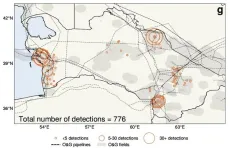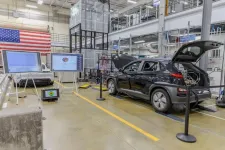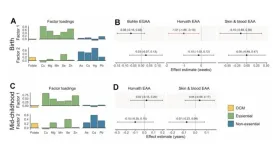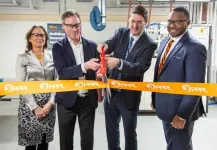(Press-News.org) Are surgeons giving patients unrealistic expectations about recovery after robotic lung surgery? That’s what CU Department of Surgery faculty member Robert Meguid, M.D., MPH, and surgery resident Adam Dyas, M.D., set out to discover after realizing the guidance they were offering patients might be based on outdated or anecdotal information.
“Traditionally, in surgery, we're taught to tell patients that they'll be back to normal from surgery within six weeks,” says Meguid, professor of cardiothoracic surgery. “In thoracic surgery over the past five or six years, we've had an increase in the percentage of operations that are done robotically, as opposed to via open or video-assisted minimally invasive approaches. Anecdotally, we're seeing patients have less pain and quicker return to function after robotic surgery, but we haven't actually studied it. When I tell patients, ‘You'll be back to normal or near normal by six weeks,’ it's a supposition. It's not evidence based.”
Collecting the data
So Meguid and Dyas set out to collect the evidence, administering to patients a survey that measured such recovery elements as cognition, physical function, depression, fatigue, sleep disturbance, pain interference, and ability to participate in social roles and activities. Patients who received a robotic anatomic lung resection — robotic surgery to remove part of the lung, most often for treatment of lung cancer — were given the survey by thoracic surgery clinic team members at their preoperative and postoperative clinic visits, then via email at 30 days and 90 days after the operation, to see how their perceived quality of life changed over time.
Gathering what’s known in medical research as patient-reported outcomes is an important part of refining care, Meguid says.
“Traditionally, we've dictated to patients what their care will be as physicians and surgeons, but appropriately and importantly, there's been an ongoing shift in medicine to engage the patients to figure out what their care is and what they want,” Meguid says. “This is a way to understand how they're recovering, as opposed to just doing a physical examination, seeing them in clinic and looking at their incisions and checking their vitals. This is much more real. Patient-reported recovery is how you think you're doing, how you feel, compared to how you want to be feeling.”
The researchers collected data on 75 individuals, finding to their surprise that patients were not fully recovered even after 90 days, despite the common wisdom they were hearing from surgeons prior to their operations.
“We found that on average, the summary quality-of-life score remained below pre-surgery baseline scores, even at 90 days, which was somewhat surprising,” Dyas says. “Even at three months, patients were not at their baseline quality of life pre-surgery. The physical aspect was almost back at baseline, but some of the individual cognitive domains had not quite returned to their baseline scores, and in fact, even decreased as time went on.”
Using the results
The results, published in January in the Journal of Robotic Surgery, can better inform surgeons what to tell patients about recovery, Dyas says — information that may in itself aid in some quality-of-life elements.
“If they're expecting to be fully well by three months and they're not, that could affect their mental and emotional wellbeing in and of itself,” Dyas says. “There’s also an opportunity to look at interventions to potentially alleviate or quicken recovery to baseline quality of life — to see if there are any interventions we could potentially apply to patients to help either in the preoperative area or post operative timeframe to try and get these quality-of-life measures back to baseline more quickly.”
Those interventions could include physical therapy and counseling, Meguid says, as well as referrals to various specialists.
“We can use this data to guide individual patient recovery plans that include physical therapy, pulmonary rehab, psychiatric counseling, increased frequency of postoperative visits, and referral to pain clinics,” he says. “There's no reason we shouldn't be able to do that at our institution, because the data collection methods already exist. I perceive that as the future of what we could do.”
Changing communication
Dyas and Meguid currently have no plans to follow patients any farther out post-recovery, though they note that the stage is set for other researchers to do so. The most important takeaway for other surgeons, they say, is to be more thoughtful about how they communicate with patients prior to surgery.
“This has really informed my discussions with patients,” Meguid says. “I tell them that most of the recovery happens in the first six weeks, similar to what I told them before, but that it takes longer than three months to get back to the quality of life you had before surgery. It's critical, as physicians and surgeons, that we educate patients to the best of our knowledge about what recovery is going to be like so they can appropriately consider surgery, and they can plan their recovery with their family. We want them to have reasonable expectations about recovery so they're not feeling betrayed by the medical system that's there to help them. “
END
Setting realistic expectations for recovery after robotic lung surgery
University of Colorado Department of Surgery resident Adam Dyas, M.D., and faculty member Robert Meguid, MD, gathered and analyzed patient-reported outcomes on postoperative recovery after robotic lung dissection
2024-03-12
ELSE PRESS RELEASES FROM THIS DATE:
UCF researchers lead $1.5 million project to improve efficiency of solar cells
2024-03-12
ORLANDO – A team of researchers from the University of Central Florida and the University of Delaware’s Institute of Energy Conversion has received a $1.5 million grant from the U.S. Department of Energy Solar Technologies Office to develop a novel metallization process that could improve the efficiency and lower the cost of solar cells, making solar energy more accessible to consumers.
The metallization process produces the metal contacts that are placed on the surface of silicon solar cells to ...
AI analysis of historical satellite images show USSR collapse in 1990s increased methane emissions, despite lower oil and gas production
2024-03-12
The collapse of the former Soviet Union in 1991 had social, political and economic effects worldwide. Among them was a suspected role in slowing human-generated methane emissions. Methane had been rising steadily in the atmosphere until about 1990. Atmospheric scientists theorized that economic collapse in the former USSR led to less oil and gas production, and thus a slowdown in the rise of global methane levels, which has since resumed.
But new University of Washington research uses early satellite records to dispute that assumption. The study, published March 12 in the ...
Charging up the commute
2024-03-12
A team of researchers at Oak Ridge National Laboratory demonstrated that a light-duty passenger electric vehicle can be wirelessly charged at 100-kW with 96% efficiency using polyphase electromagnetic coupling coils with rotating magnetic fields.
ORNL’s patented system transferred power to a Hyundai Kona EV across a five-inch airgap using electromagnetic fields, a process similar to the wireless charging of small consumer devices.
“We’ve achieved the highest power density in the world for a wireless charging system for this class of vehicle,” ORNL’s Omer Onar said. “Our ...
$5 million grant bets on computational biology, AI to change the future of cancer
2024-03-12
SAN FRANCISCO—A multidisciplinary research team at Gladstone Institutes, led by Senior Investigator Katie Pollard, PhD, has received $5 million in funding through a newly launched grant program designed to ignite a fresh wave of cancer discoveries using computational biology and artificial intelligence.
The new Transformative Computational Biology Grant Program from the Biswas Family Foundation, in partnership with the nonpartisan think tank Milken Institute, is providing a total of nearly $14 million to five research groups.
At Gladstone, the grant establishes ...
Integrating renewables and machine learning for improved grid stability
2024-03-12
In the race to achieve a net-zero future based on clean energy, renewable energy sources like solar and wind power have emerged as potential champions in the battle against climate change. However, as traditional synchronous generators are replaced by inverter-based renewable energy resources, the transition creates a low-inertia challenge within the existing power grids leading to stability and reliability concerns.
Xingpeng Li, assistant professor of electrical and computer engineering at the University of Houston, is working on a solution that will allow seamless integration of renewable energy ...
Global ecosystem contribute trillions in its services with key synergies and trade-offs
2024-03-12
Trade-offs and synergies between ecosystem services constitutes an important topic in ecosystem management. The value of each service is substantially influenced by human activities, and changes will affect human decisions. Given the variability in trade-offs and synergies, the simultaneous optimization of multiple ecosystem services presents a considerable challenge.
In a study published in Environmental Science and Ecotechnology, a team from the Chinese Academy of Environmental Planning, which has completed ...
Association of prenatal vitamins and metals with epigenetic aging at birth and in childhood
2024-03-12
“[...] our findings support the hypothesis that the intrauterine environment, particularly essential and non-essential metals, affect epigenetic aging biomarkers across the life course.”
BUFFALO, NY- March 12, 2024 – A new research paper was published in Aging (listed by MEDLINE/PubMed as "Aging (Albany NY)" and "Aging-US" by Web of Science) Volume 16, Issue 4, entitled, “Associations of prenatal one-carbon metabolism nutrients and metals with epigenetic aging biomarkers at birth and in childhood in a US cohort.”
Epigenetic gestational age acceleration (EGAA) at birth and epigenetic age acceleration (EAA) in childhood may be biomarkers of ...
Gun manufacturers’ ads appeal to women as ‘serious students’ of firearms to boost sales
2024-03-12
CORVALLIS, Ore. – Gun manufacturers are appealing to women as “serious students” of firearms in their advertising – a shift in strategy over the last two decades that may be contributing to increased gun sales, a new study shows.
From 2007 through 2022, women’s gun ownership rose from 16% to 22%, while the rate for men stayed roughly steady at 43%. And more than half of new gun owners in the United States between 2019 and 2021 were women.
“Those trends in gun ownership ...
In the resuscitation discussion, do words matter between doctors and patients?
2024-03-12
Adults 65 and older, who were hospitalized for a variety of medical conditions, had highly satisfying conversations about whether they wanted CPR, regardless of whether doctors used the terms “allow a natural death” or “do not resuscitate” for indicating no CPR, according to a pilot study by Rutgers Health researchers.
The study, published in the Journal of the American Geriatrics Society, sought to determine the best language doctors could use when discussing a patient’s code ...
PPPL unveils new laboratory space to advance quantum information science
2024-03-12
Building on its more than 70 years pioneering the study of fusion energy, the U.S. Department of Energy’s (DOE) Princeton Plasma Physics Laboratory (PPPL) has added a new field to its research portfolio — quantum information science.
On March 11, PPPL opened its new Quantum Diamond Lab (QDL), a space devoted to studying and refining the processes involved in using plasma, the electrically charged fourth state of matter, to create high-quality diamond material for quantum information science applications. Scientists around the ...
LAST 30 PRESS RELEASES:
A new roadmap spotlights aging as key to advancing research in Parkinson’s disease
Research alert: Airborne toxins trigger a unique form of chronic sinus disease in veterans
University of Houston professor elected to National Academy of Engineering
UVM develops new framework to transform national flood prediction
Study pairs key air pollutants with home addresses to track progression of lost mobility through disability
Keeping your mind active throughout life associated with lower Alzheimer’s risk
TBI of any severity associated with greater chance of work disability
Seabird poop could have been used to fertilize Peru's Chincha Valley by at least 1250 CE, potentially facilitating the expansion of its pre-Inca society
Resilience profiles during adversity predict psychological outcomes
AI and brain control: A new system identifies animal behavior and instantly shuts down the neurons responsible
Suicide hotline calls increase with rising nighttime temperatures
What honey bee brain chemistry tells us about human learning
Common anti-seizure drug prevents Alzheimer’s plaques from forming
Twilight fish study reveals unique hybrid eye cells
Could light-powered computers reduce AI’s energy use?
Rebuilding trust in global climate mitigation scenarios
Skeleton ‘gatekeeper’ lining brain cells could guard against Alzheimer’s
HPV cancer vaccine slows tumor growth, extends survival in preclinical model
How blood biomarkers can predict trauma patient recovery days in advance
People from low-income communities smoke more, are more addicted and are less likely to quit
No association between mRNA COVID-19 vaccination during pregnancy and autism in children, new research shows
Twist-controlled magnetism grows beyond the moiré
Root microbes could help oak trees adapt to drought
Emergency department–initiated buprenorphine for opioid use disorder
Call for action on understudied lung cancer in never-smokers
Different visual experiences give rise to different neural wiring
Wearable trackers can detect depression relapse weeks before it returns, study finds
Air pollution and the progression of physical function limitations and disability in aging adults
Historically Black college or university attendance and cognition in US Black adults
New “crucial” advance for quantum computers: researchers manage to read information stored in Majorana qubits
[Press-News.org] Setting realistic expectations for recovery after robotic lung surgeryUniversity of Colorado Department of Surgery resident Adam Dyas, M.D., and faculty member Robert Meguid, MD, gathered and analyzed patient-reported outcomes on postoperative recovery after robotic lung dissection





